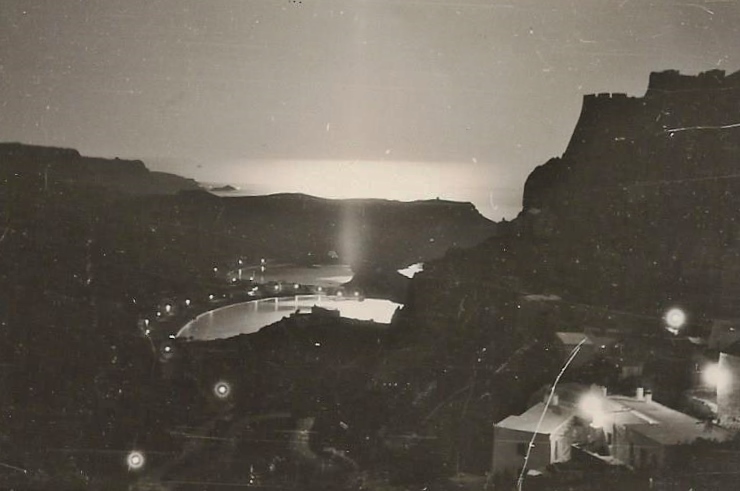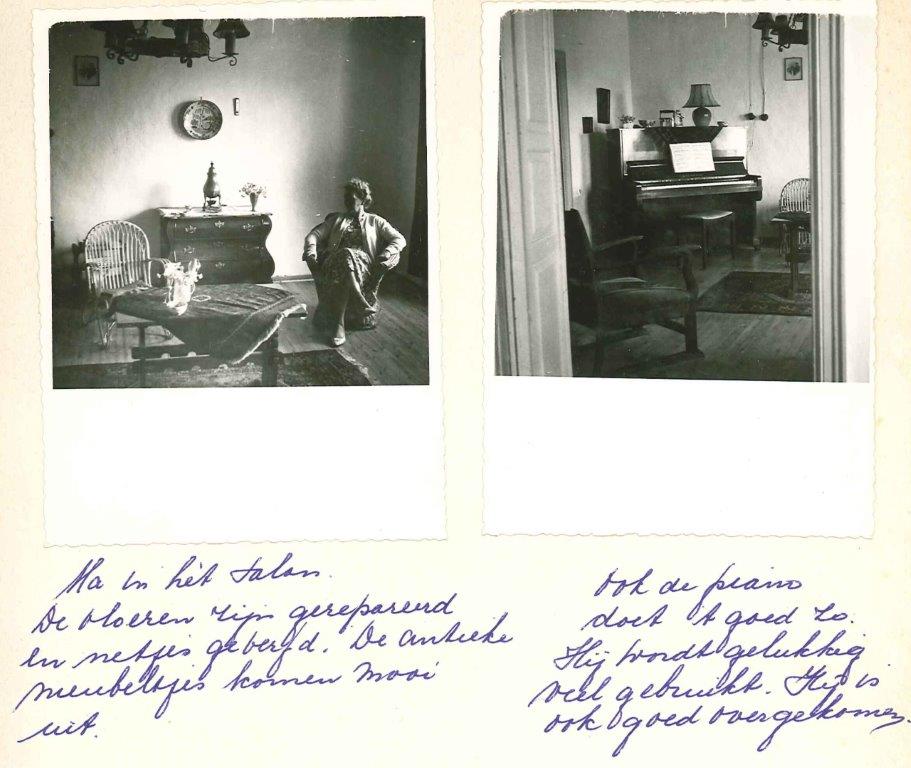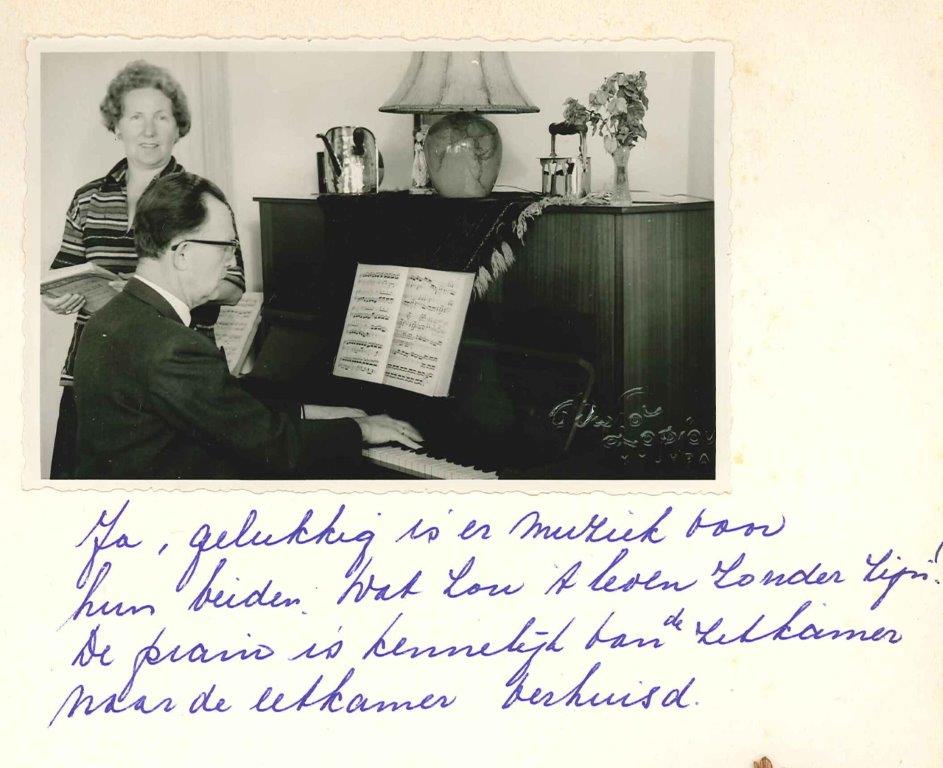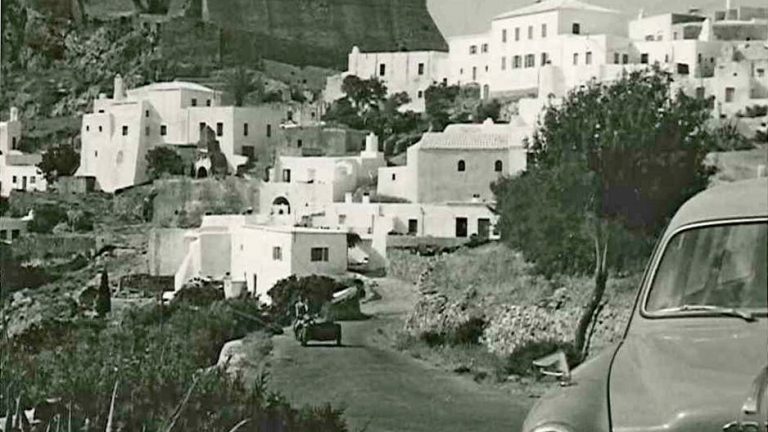Mr. Koksma was an architect and civil engineer from the Netherlands who on request of the WCC had been to Kythera the previous year to investigate and discuss this matter with Bishop Meletios. Early 1960 the WCC offered George and Anna Koksma a contract of US $ 30,- each per month living allowance (1 US $ at that time was 30 drachmas), they agreed and packed everything to be sent by boat to Kythera for an indefinite period of time. With a fully loaded station-wagon they themselves drove to Greece.

A little history in spring 1960
Do imagine a nearly pitch-dark night in Kapsali Harbor, only a few street lights on the tiney fisher boat landing stage and along the beach for it is 27 April 1960.
The weekly steamer from Piraeus is to arrive after having stopped innumerable times in small sheltered bays in the Peloponnese, and nowhere there was an adequate landing stage to facilitate disembarkation. Now they have to disembark in the same way: step or jump, pending the height of the waves, in small boats to be rowed ashore.
They are the Dutch couple George and Anna Koksma, he 52 and she 49 years old. His Grace Bischop Meletios welcomes them,he already knew George from the past year when George had com to the island for a short visit. Anna and George do speak their languages but not one word of Greek. Fortunately, the Bishop speaks very well German and tells them that they will stay at his household in Chora. After a to them amanzing taxi drive on the serpent winding road from Kapsali to Chora and having put their luggage in the bedroom the Bishop tells them that he has to leave them now for he has to take the same boat back to Piraeus as his presence is required in Athens for some weeks. They are bewildered, how now to communicate with people as they do not know anybody yet? Then the light flicker and after ten minutes it is dark.

Next morning when they look out of the window and see all the flat roofs towards the Kastro they for a moment were truly bewildered, again, and think themselves to be in a Biblical country. And now they fully understand understand when in passages in the Bible they speak of living on the roofs. Both are practicing Christians and are of the opinion that their practical work experience could be of more value outside Holland and so they had informed the World Council of Churches to be available for a period of at least 12 to 15 years. Now they find themselves at Kythira after Bishop Meletios two years ago had requested assistance from the WCC in Geneva to improve living conditions in his diocese. For this reason, with due care, they set up a development plan in a 10 point program.

George is a modern practical thinking architect and civil engineer. Anna is daughter of a building contracter. George likes to talk, in the beginning also using his hands to make himself understand. After some time he knows and speaks enough Greek words and sentences to communicate with people. Anna is an accomplished classical singer but very soon she also loves and sings many Greek folk songs. Both love music very much. George playing the piano and Anna singing her classical songs. The proverbial Dutch cleanliness Anna makes come true when, after stayed three months in the Bishop’s household, they moved to a rented house opposite the ‘agora’ in Chora. All floors had to be scrubbed and wooden floors thoroughly polished. Not once awhile but every week! Once in this home and office they often had musical evenings with invited local people. When George was working in his office on some very special or urgent technical matter, and people wanting to see him, they had first to get past Anna. For she kept the agenda!

The Greek language
Both George and Anna are members of a rather conservative section of the Protestant Church in Holland and speak Dutch, English, French and German, but do not speak one word of Greek and are dependent on interpreters. They find in Chora very old Dr. Kassapis and Mr. Altanis, teacher gymnastics, who both speak fluently German, willingly to act as such. Fortunately also the Bishop speaks very well German and the first 3 months they are quests in his household and have nearly every evening contact with the Bishop. After that they move to a larger rented house opposite the agora in Chora, where through the following years they also had their office.
Already in their first month at Kythera George and Anna learn the meaning of “siga, siga” and that time and distance have quite another meaning to a lot of Kytherians. In October they learn that as soon as the olive picking season arrives it will be very difficult to find labours to do other work.
The local’s
Following is a quote from Mr. Koksma’s weekly work diary (1960, October 7) to Geneva about a conversation he had with Mr. Altanis:
– People are asking “what does this Koksma-fellow really do here?” They do not see anything but us touring all over the island, but still no trees, still no water and still no gold laying on the streets. And people say “sure, sure Mr. Koksma, cooperation, bringing the people together once more. That is right. Bundling of power, just what you say. Exactly!” But as soon as they can, they execute your proposals behind your back. Without you.
To this Mr. Altanis, teacher, answers:
…“does not matter who does. Only this is the fact: now that Mr. Koksma has come to the island, now everyone starts doing something as quick as he can”,
and he explains that even when people oppose to the team’s proposals, but start doing something, that this in it self is a result of the Team’s being at Kythera.

